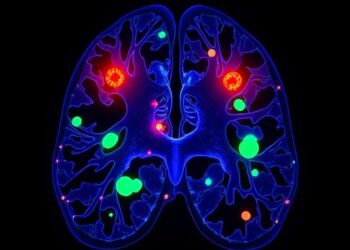A team of UC Davis Health researchers discovered that a common anti-inflammatory drug, mesalamine, can replace the work of good bacteria in fighting the nasty fungus Candida albicans in the gut.
A team of UC Davis Health researchers discovered that a common anti-inflammatory drug, mesalamine, can replace the work of good bacteria in fighting the nasty fungus Candida albicans in the gut.
C. albicans, or candida, is known to cause yeast infections. In some cases, it develops into invasive candidiasis, a potentially fatal infection occurring mostly in patients with compromised immunity.
The researchers found that this fungus can’t grow without an oxygen supply. Their study in mice showed that the drug can maintain a low oxygen (hypoxia) environment that prevents fungal bloom in the gut.
Their study appears today in Cell Host & Microbe
Antibiotic use may lead to fungal bloom in the gut
The team studied how C. albicans colonizes the gut. The fungus, best known for causing vaginal yeast infections, is usually treated with a topical or oral antifungal without serious side effects. It also harmlessly lives in the gut of around 60% of people.
Yet, when the body’s immunity goes down due to cancer or chemotherapy, the fungus may grow beyond the colon and spread throughout the body. In such cases, the patient develops invasive candidiasis.
“Invasive candidiasis is a potentially deadly infection with a mortality rate of around 50%. That’s even with the best available treatment,” explained the study’s lead author Andreas Bäumler. Bäumler is a distinguished professor in the Department of Medical Microbiology and Immunology.
Patients with leukemia and other blood cancers may need to take antibiotics. This use may cause an imbalance in the gut’s microbial community. It reduces Clostridia, a group of bacteria that promotes resistance to fungi colonization in the gut. With less Clostridia, C. albicans grows and colonizes in the tract.
“A bloom of C. albicans in the gut during antibiotic therapy is the most common cause of candidemia in people treated for blood cancers,” Bäumler explained. Candidemia is the presence of fungi or yeast in the blood.
Bäumler and his team wanted to understand the factors involved in antibiotic-induced colonization of C. albicans in the gut.
Candida loves simple sugars and oxygen
They first colonized germ-free mice with Candida to see what the fungus consumed to bloom. They realized that Candida really liked simple sugars, similar to those found in high-sugar diets. Then, they tested its growth in a petri dish. They placed Candida with simple sugars in an aerobic (with oxygen) setting, and the fungi bloomed.
“A healthy gut has low oxygen. So, we repeated the test in a hypoxia setting,” Bäumler said. The fungi didn’t grow despite the presence of sugars. This meant oxygen is a necessary condition for Candida growth.
The role of probiotics in preventing fungal growth
The team did a series of experiments that showed antibiotic use reduced Clostridia in the gut. Giving mice probiotics, such as Clostridia, prevented C. albicans from growing in the gut. Yet, probiotics can be killed by antibiotics and cancer therapy. For this reason, probiotics would not help patients with leukemia or other blood cancers.
“Probiotics are often not safe in patients at the highest risk for invasive candidiasis,” Bäumler said. “Finding a therapy that can function like probiotics but can endure the impact of cancer treatment and antibiotics was important.”
Anti-inflammatory drugs as faux-biotics
The team explored 5-aminosalicylic acid (5-ASA) as a safer way to control C. albicans in the gut. 5-ASA, also known as mesalamine, is an anti-inflammatory drug. It is used to treat inflammatory bowel diseases (IBD) like Crohn’s disease and ulcerative colitis.
The team tested 5-ASA in mice treated with antibiotics. They found that the drug could replace the work of probiotics by preventing oxygen in the colon and C. albicans from expanding in the gut.
“Limiting oxygen in the gut by replacing the function of good bacteria could be a strategy for reducing invasive candidiasis,” Bäumler said. “Our study opens a totally new treatment option for fatal fungal infections, especially for patients with cancer. After all, fungi cannot become resistant against hypoxia.”
The team proposed the term “faux-biotics” to refer to products, such as 5-ASA, that mimic the function of probiotics like Clostridia.
The first coauthors of the study are Hannah Savage, Derek Bays and Connor Tiffany. The other co-authors are Mariela Gonzalez, Eli Bejarano, Thaynara Carvalho, Zheng Luo, Hugo Masson, Henry Nguyen, Renato Santos, Krystle Reagan and George Thompson of UC Davis.
Journal
Cell Host & Microbe
Method of Research
Experimental study
Article Title
Epithelial hypoxia maintains colonization resistance against Candida albicans
Article Publication Date
4-Jun-2024
COI Statement
No conflict of interest




